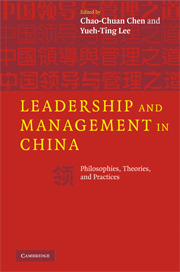Book contents
- Frontmatter
- Contents
- List of figures
- List of tables
- List of contributors
- Preface
- Acknowledgments
- Introduction: The diversity and dynamism of Chinese philosophies on leadership
- Part I The Confucian foundations
- Part II Alternative traditional Chinese leadership philosophies
- 3 Daoist leadership: theory and application
- 4 Leadership theory of Legalism and its function in Confucian society
- 5 Strategic leadership of Sunzi in the Art of war
- Part III Modern Chinese leadership theories and practices
- Index
- References
4 - Leadership theory of Legalism and its function in Confucian society
Published online by Cambridge University Press: 14 May 2010
- Frontmatter
- Contents
- List of figures
- List of tables
- List of contributors
- Preface
- Acknowledgments
- Introduction: The diversity and dynamism of Chinese philosophies on leadership
- Part I The Confucian foundations
- Part II Alternative traditional Chinese leadership philosophies
- 3 Daoist leadership: theory and application
- 4 Leadership theory of Legalism and its function in Confucian society
- 5 Strategic leadership of Sunzi in the Art of war
- Part III Modern Chinese leadership theories and practices
- Index
- References
Summary
This chapter reorganizes Hanfei's theory of leadership from the perspective of social science and explains its implications in contemporary Chinese society. It begins with a brief biography of Hanfei and the origins of his thought. His theory of leadership is then presented as a formal theory and its meanings are explained in terms of modern organizational theories. Based on Hwang's (1995; 2001) analysis of the deep structure of Confucianism, a conceptual framework is proposed to illustrate the dialectical relationship between Hanfei's theory and Confucianism. Finally, operation of the firm and state in Taiwan are used as examples to explain how this conceptual framework may be used to study Chinese organizational behavior.
Introduction
Among the various Chinese indigenous leadership theories, the importance of Legalism is second only to Confucianism. Fa Jia (the Legalist school) emerged during the Warring States Period (403–222 BCE) and its main thoughts were refined against the cultural background of Confucianism, although its contents are in direct opposition to Confucianism in many respects.
During the Han dynasty, Tung Jong-shu (179–104 BCE) proposed integrating the two systems with the idea of “making judicial sentence by the Confucian classic of Spring and Autumn” and “utilizing Legalism as an instrument to consolidate the Confucian social system.” (Chu, 1961). Rulers of China began to use Legalist methods to defend their power and position and to control people, but retained Confucian doctrine to educate and discipline people.
- Type
- Chapter
- Information
- Leadership and Management in ChinaPhilosophies, Theories, and Practices, pp. 108 - 142Publisher: Cambridge University PressPrint publication year: 2008
References
- 16
- Cited by



